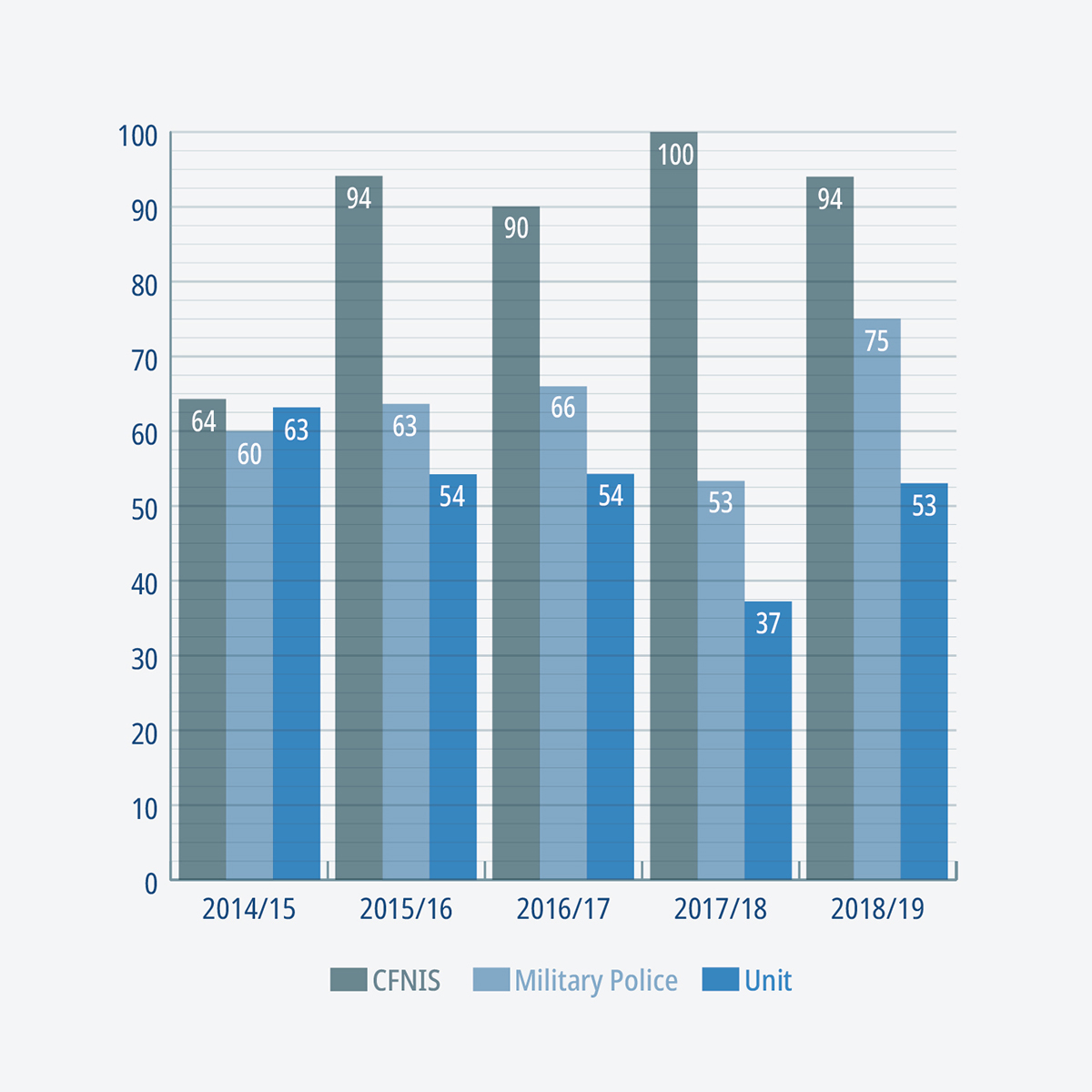Chapter Three: Military Justice Proceedings: Year in Review
The information and analysis provided below reflects the operations of the CMPS over the course of the reporting period in relation to all courts martial, referrals, post-charge reviews, requests for pre-charge advice, appeals and custody review hearings.
Courts Martial
This section provides an overview and analysis of those cases heard at court martial during the reporting period. For a complete breakdown of all court martial data for the reporting period please refer to Annex A.
Number of Courts Martial
This past reporting period there were a total of 51 courts martial.Footnote 15 Of those, 45 were Standing Courts Martial and six were General Courts Martial. Although this is slightly below the average number of courts martial over the past five years (57), this is not unexpected in that there were only three of four sitting military judges over the course of the reporting period. In addition, 40 cases were affected by the CMAC decision in R v BeaudryFootnote 16 meaning those cases were prevented from being heard through the military justice system. A complete picture of the number of courts martial broken down by type of court martial since 2014/15 can be found at Figure 3-1.
Figure 3-1: Number of Courts Martial by Type
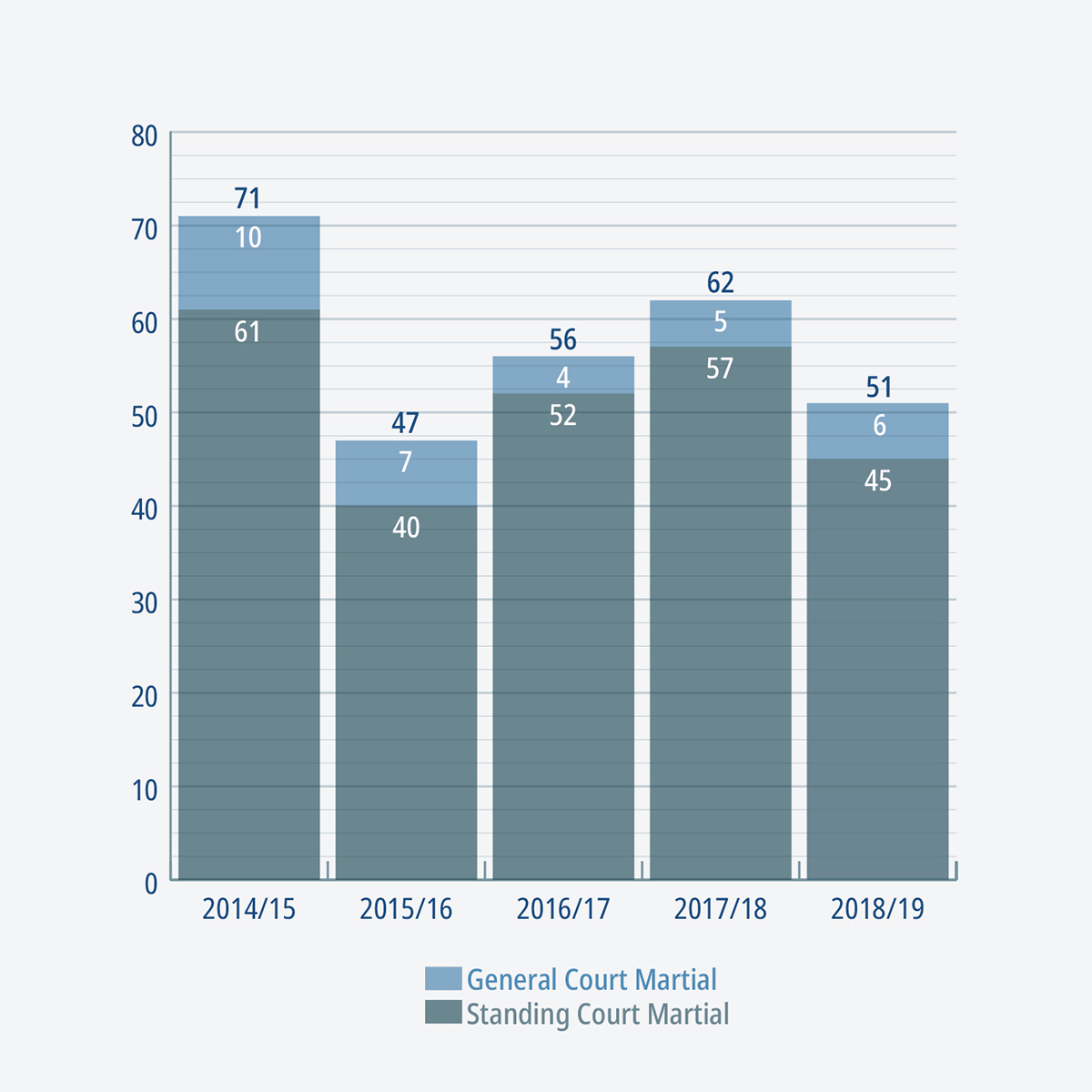
Figure 3-1: Graph breakdown
| 2014/15 | 2015/16 | 2016/17 | 2017/18 | 2018/19 | |
|---|---|---|---|---|---|
| General Court Martial | 10 | 7 | 4 | 5 | 6 |
| Standing Court Martial | 61 | 40 | 52 | 57 | 45 |
| Total | 71 | 47 | 56 | 62 | 51 |
Court Martial Results
Of those 51 courts martial, accused persons were found guilty of one or more charges in 43 cases, found not guilty of all charges in six cases, had all charges withdrawn in one case and had a termination of proceedings in one case. Figure 3-2 shows a breakdown of all court martial results since 2014/15.
Figure 3-2: Courts Martial Results
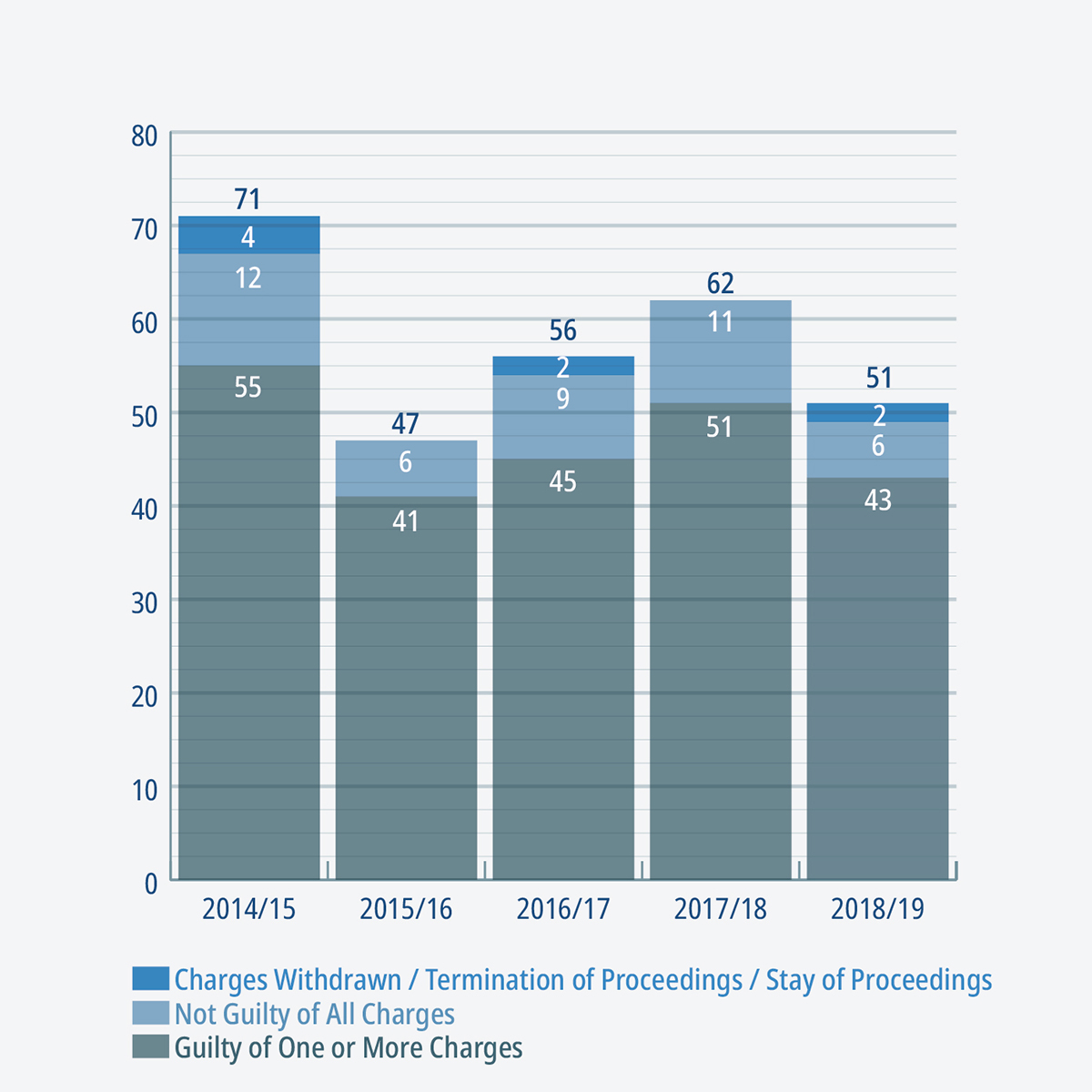
Figure 3-2: Graph breakdown
| 2014/15 | 2015/16 | 2016/17 | 2017/18 | 2018/19 | |
|---|---|---|---|---|---|
| Charges Withdrawn / Termination of Proceedings / Stay of Proceedings | 4 | 0 | 2 | 0 | 2 |
| Not Guilty of All Charges | 12 | 6 | 9 | 11 | 6 |
| Guilty of One or More Charges | 55 | 41 | 45 | 51 | 43 |
| Total | 71 | 47 | 56 | 62 | 51 |
Punishments at Court Martial
While only one sentence may be imposed at a court martial, more than one punishment may be given as a part of that sentence. In this reporting period a total of 43 sentences were handed down by courts martial involving a total of 57 punishments. The most common punishment awarded at courts martial was a fine with a total of 35 fines awarded, representing 61 percent of all punishments and awarded in 81 percent of all sentences. The next most common punishment awarded was a severe reprimand which was awarded in 10 cases and accounted for over 17 percent of all punishments.
A total of four custodial punishments were awarded representing nearly nine percent of all punishments. Of those custodial punishments, there was one punishment of detention handed down at court martial which was suspended by the military judge. A complete breakdown of all punishments imposed at courts martial from 2014/15 can be found in Table 3-3.
Table 3-3: Punishments at Court Martial
| Punishment | 2014/15 | 2015/16 | 2016/17 | 2017/18 | 2018/19 |
|---|---|---|---|---|---|
| Dismissal | 1 | 2 | 1 | 3 | 2 |
| Imprisonment | 6 | 3 | 4 | 7 | 3 |
| Detention | 4 | 4 | 4* | 4** | 1*** |
| Reduction in Rank | 1 | 3 | 9 | 9 | 2 |
| Severe Reprimand | 18 | 10 | 6 | 11 | 10 |
| Reprimand | 13 | 13 | 17 | 20 | 4 |
| Fine | 39 | 32 | 39 | 38 | 35 |
| Minor Punishments | 0 | 0 | 0 | 0 | 0 |
| Total | 82 | 67 | 80 | 95 | 57 |
* One of these punishments was suspended by the Military Judge.
** Three of these punishments were suspended by the Military Judge.
*** This punishment was suspended by the Military Judge.
Court Martial Timelines
During this reporting period the average number of days from the time a file was referred to the DMP until a decision had been taken by a prosecutor was approximately 88 days. This is a decrease of seven percent from the previous reporting period. Figure 3-4 illustrates the average number of days from referral to a post-charge decision for the past five reporting periods.
Figure 3-4: Average Number of Days from Referral to Post-Charge Decision
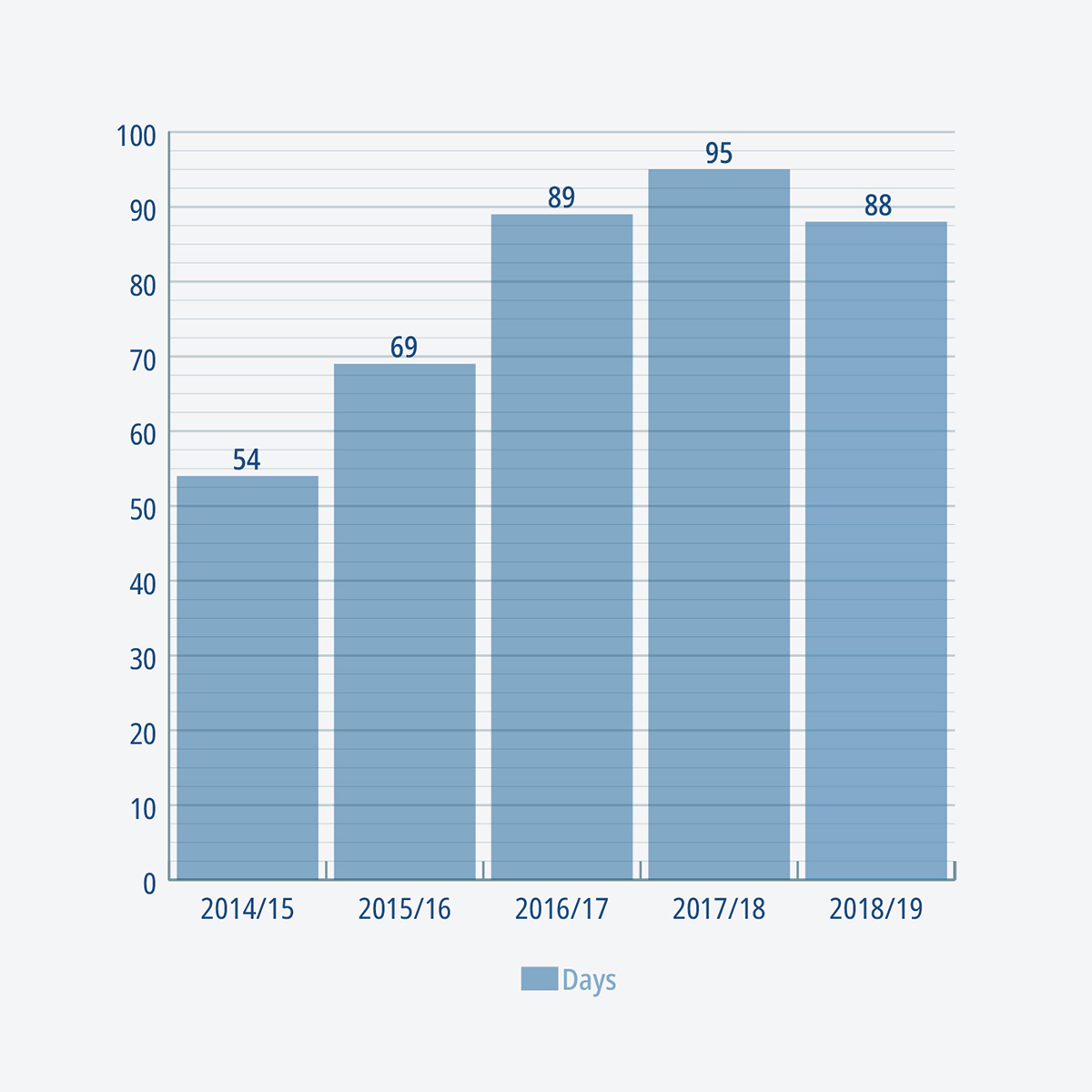
Figure 3-4: Graph breakdown
| 2014/15 | 2015/16 | 2016/17 | 2017/18 | 2018/19 | |
|---|---|---|---|---|---|
| Days | 54 | 69 | 89 | 95 | 88 |
In this reporting period, the average number of days from the preferral of charges until the commencement of the court martial was 244 days. This is an increase of 33 days in comparison to the previous reporting period and is 16 days above the five year average. Figure 3-5 shows the average number of days from the preferral of charges until the commencement of the court martial since 2014/15.
Figure 3-5: Average Number of Days from Preferral to Commencement of Court Martial
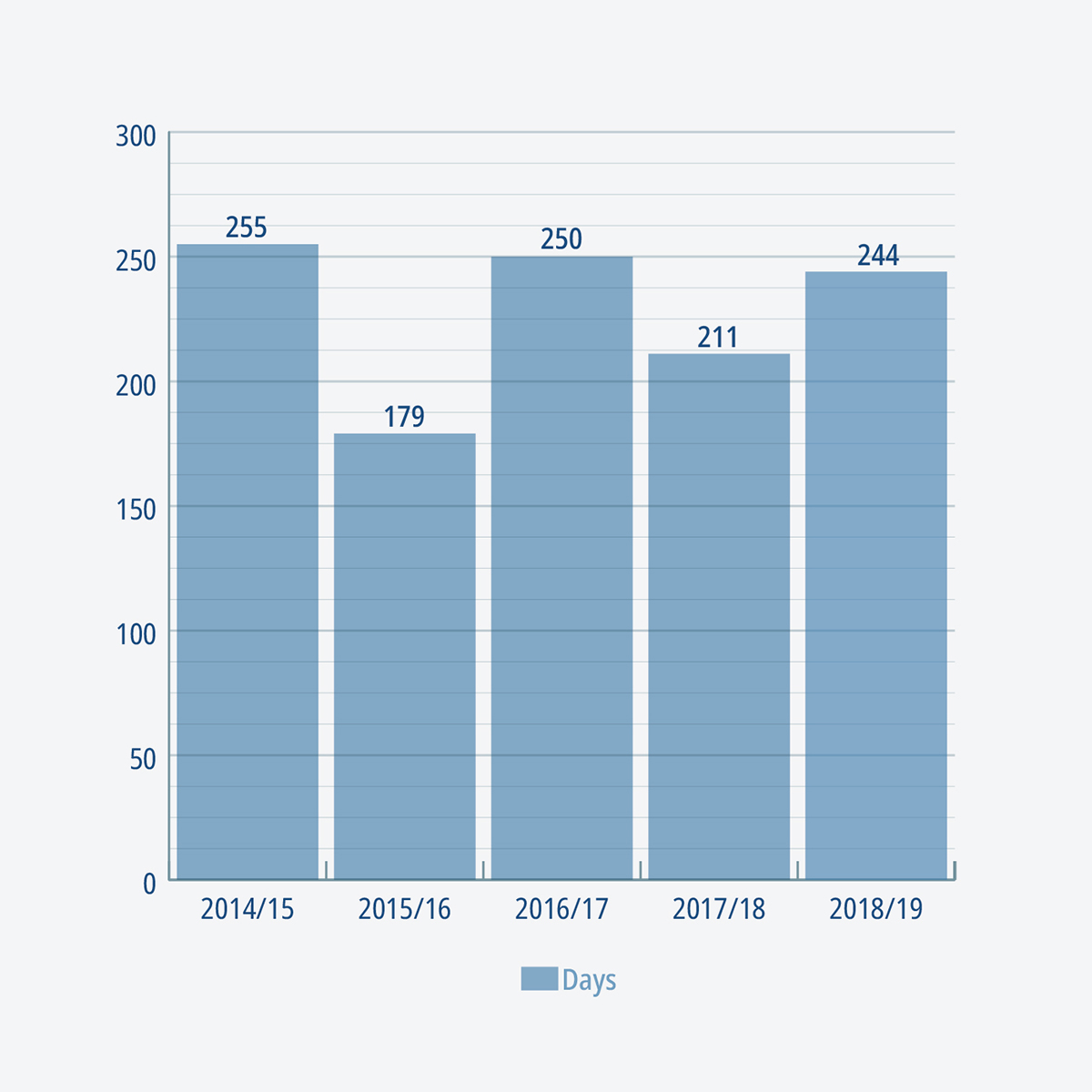
Figure 3-5: Graph breakdown
| 2014/15 | 2015/16 | 2016/17 | 2017/18 | 2018/19 | |
|---|---|---|---|---|---|
| Days | 255 | 179 | 250 | 211 | 244 |
Case Management
Number of Referrals
During this reporting period there were 102 referrals received by the DMP. This is consistent with the average number of referrals received over the past five years which is approximately 109. When combined with the 70 referrals carried over from the previous reporting period, there were a total of 172 referrals processed during this reporting period. The 172 referrals processed during the current reporting period is the second lowest number of referrals processed over the past five years but is relatively consistent with the five year average of 179 referrals per year.
Of those 172 referrals processed, 154 cases were completed in that a decision on post-charge was taken by a prosecutor leaving 18 referrals carried over into the next reporting period. This number of files carried over is well below the average number of referrals carried over to the following year over the past five years which is approximately 58 files. Figure 3-6 shows the total number of referrals processed over the past five reporting periods.
Figure 3-6: Total Number of Referrals Processed
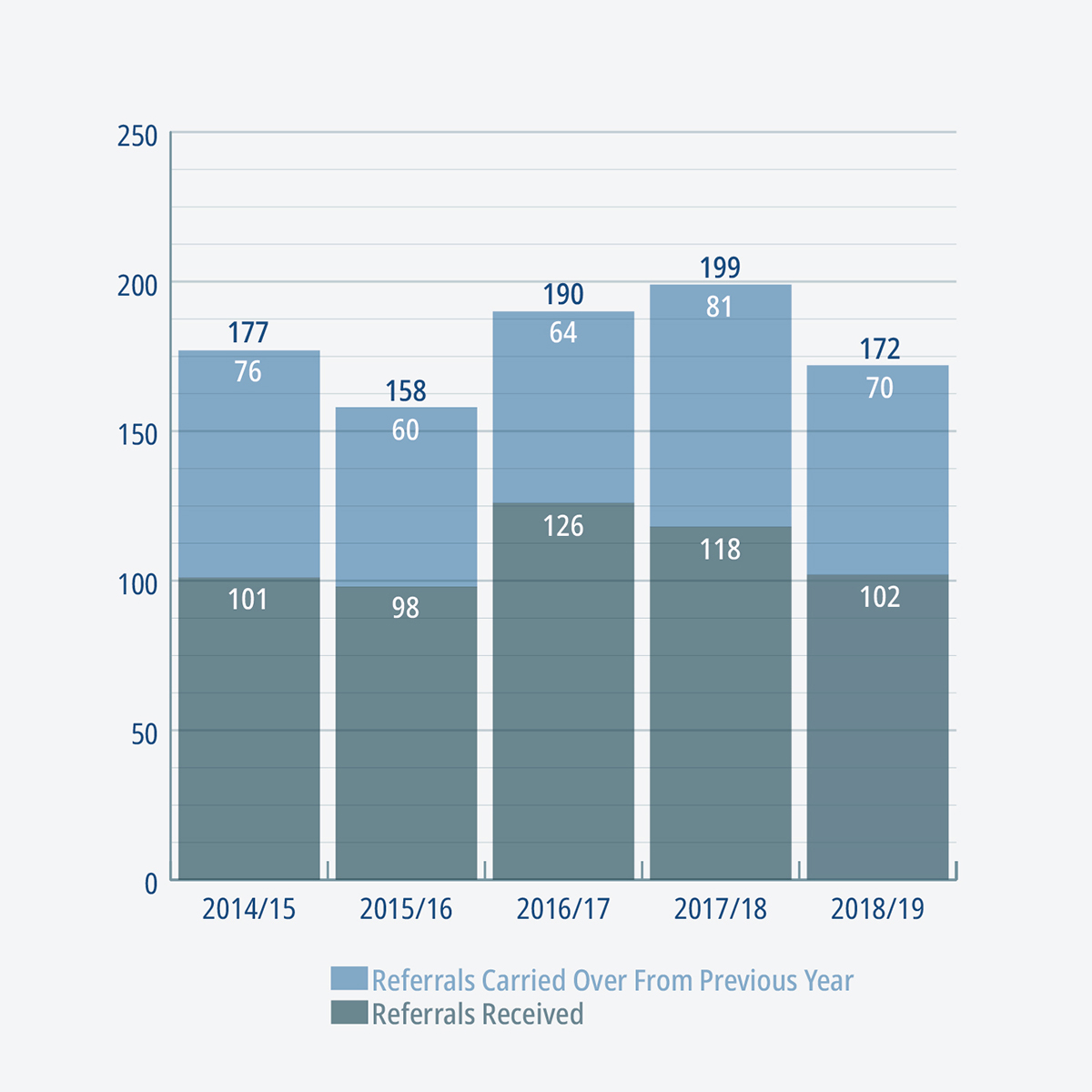
Figure 3-6: Graph breakdown
| 2014/15 | 2015/16 | 2016/17 | 2017/18 | 2018/19 | |
|---|---|---|---|---|---|
| Referrals Carried Over From Previous Year | 76 | 60 | 64 | 81 | 70 |
| Referrals Received | 101 | 98 | 126 | 118 | 102 |
| Total | 177 | 158 | 190 | 199 | 172 |
This reporting period there were a total of 107 cases where charges were preferred and 47 cases where no charges were preferred giving an overall preferral rate of 69 percent. Although this is the highest preferral rate in the last five reporting periods it is only slightly higher than the average preferral rate of 63 percent over the past five reporting periods. However, as can be seen in Figure 3-8 the total number of prosecutorial decisions taken on post charge is significantly higher than it has been over the past five reporting periods. The reason for this is that although there were not as many referrals as there have been in previous years, there were far fewer files which are carried forward to the next reporting period meaning that the rate of files processed (90 percent) was much higher this reporting period. Figure 3-7 shows the total number of preferrals and non-preferrals for the five previous reporting periods.
Figure 3-7: Total Number of Preferrals and Non-Preferrals

Figure 3-7: Graph breakdown
| 2014/15 | 2015/16 | 2016/17 | 2017/18 | 2018/19 | |
|---|---|---|---|---|---|
| Non-Preferrals | 38 | 36 | 44 | 41 | 47 |
| Preferrals |
63 | 62 | 82 | 55 | 107 |
| Total | 101 | 98 | 126 | 96 | 154 |
Preferral Rates by Investigative Agency
Although all files referred to the DMP are received through a referral authority, the incident giving rise to the charge may be investigated by one of three investigative agencies – the CFNIS, an investigator with the military police who is not a member of the CFNIS and a unit investigator. The rate of preferrals varies greatly as between the investigative agency. For example, during this reporting period the preferral rate for those files investigated by the CFNIS was 94 percentFootnote 17 , this is a much higher preferral rate when compared to that of the regular military police and unit investigators which were 75 percent and 53 percent, respectively.
This divergence of preferral rates has been consistent over the past several years with those investigations conducted by the CFNIS being preferred at a much higher rate than regular military police and unit investigators. For a complete overview of preferral rates by investigative agency over the past five years, please refer to Figure 3-8.
Figure 3-8: Graph breakdown
| 2014/15 | 2015/16 | 2016/17 | 2017/18 | 2018/19 | |
|---|---|---|---|---|---|
| CFNIS | 64 | 94 | 90 | 100 | 94 |
| Military Police |
60 | 63 | 66 | 53 | 75 |
| Unit | 63 | 54 | 54 | 37 | 53 |
The DMP has identified this as an issue and has taken a number of courses of action to improve the preferral rates of all investigative agencies. For example, this reporting period he amended a number of his policy directives to require his prosecutors to provide feedback to the investigator both when there is a decision not to prefer a charge and also at the conclusion of the court martial with the aim of improving the quality of future investigations.
Pre-Charge Advice
Number of Requests for Pre-Charge Legal Advice
Prosecutors with the CMPS are responsible to provide pre-charge advice to both the CFNISFootnote 18 and to unit legal advisors. Footnote 19 In this reporting period, there were a total of 118 cases sent to the CMPS for pre-charge legal advice. In addition, there were 16 pre-charge files carried over from the previous reporting period for a total of 134 pre-charge files processed during the reporting period. Of the 134 requests for pre-charge legal advice, three files were pending at the end of the reporting period.
The number of pre-charge files sent for review by a military prosecutor remained relatively consistent this reporting period when compared to the previous reporting period where there were 129 requests for pre-charge advice. Figure 3-9 shows the total number of pre-charge files processed for each of the previous three reporting periods.
Figure 3-9: Total Number of Pre-Charge Files Processed
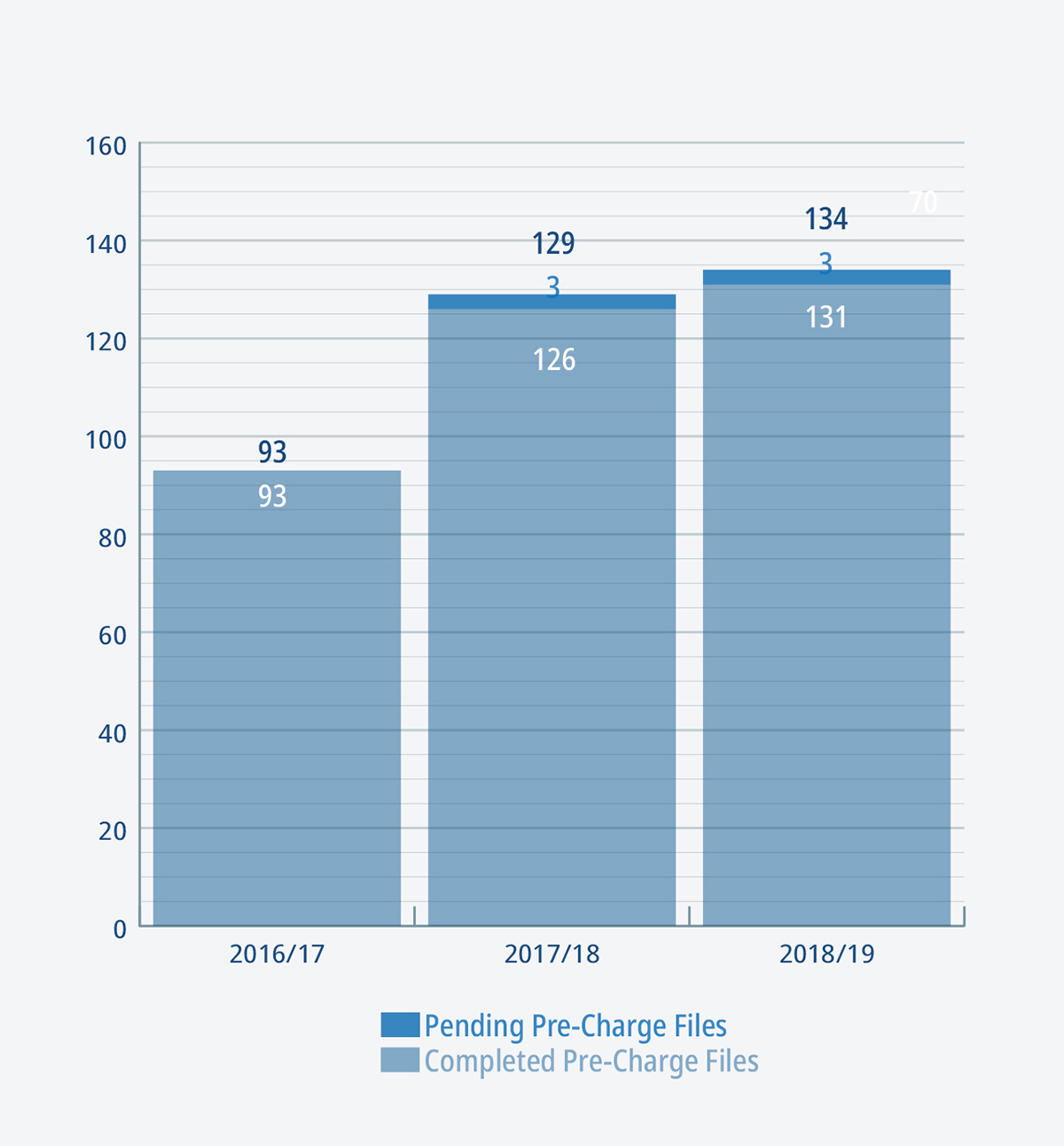
Figure 3-9: Graph breakdown
| 2016/17 | 2017/18 | 2018/19 | |
|---|---|---|---|
| Pending Pre-Charge Files | 0 | 3 | 3 |
| Completed Pre-Charge Files | 93 | 126 | 131 |
| Total | 93 | 129 | 134 |
Origin of Requests for Pre-Charge Legal Advice
As in previous reporting periods, the majority of requests for pre-charge legal advice come from the CFNIS. During this reporting period there were 91 requests for pre-charge legal advice from the CFNIS compared to only 43 requests from unit legal advisors. Figure 3-10 shows the number of requests for pre-charge legal advice broken down by requestor.
Figure 3-10: Origin of Requests for Pre-Charge Legal Advice
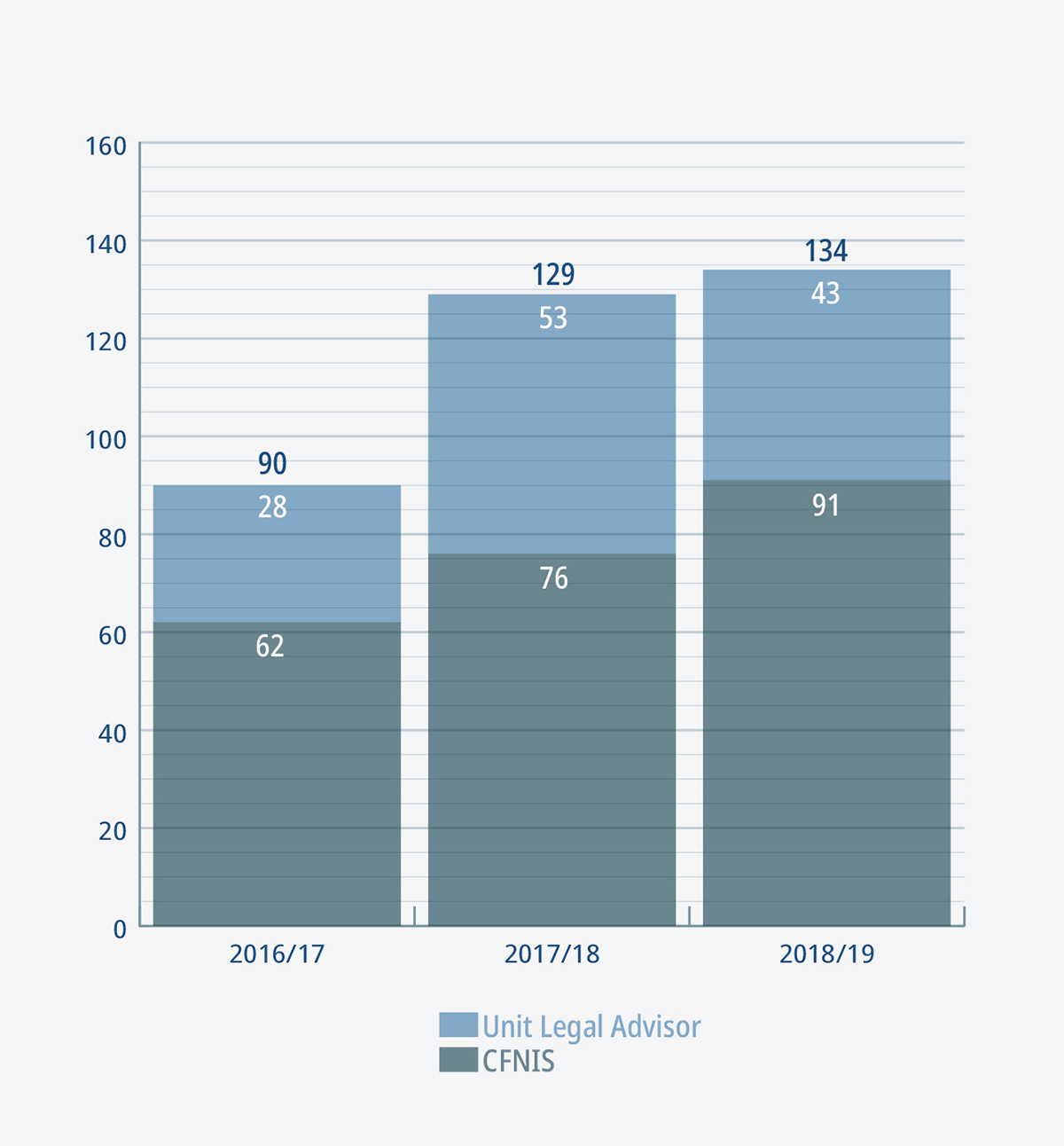
Figure 3-10: Graph breakdown
| 2016/17 | 2017/18 | 2018/19 | |
|---|---|---|---|
| Unit Legal Advisor | 28 | 53 | 43 |
| CFNIS | 62 | 76 | 91 |
| Total | 90 | 129 | 134 |
Outcome of Requests for Pre-Charge Legal Advice
During the reporting period charges were recommended in 62 cases and no charges were recommended in 67 cases.Footnote 20 Therefore, charges were recommended in approximately 48 percent of all requests for pre-charge legal advice. Figure 3-11 provides an overview of the number of cases where charges were and were not recommended for the past three reporting periods.
Figure 3-11: Outcome of Requests for Pre-Charge Legal Advice
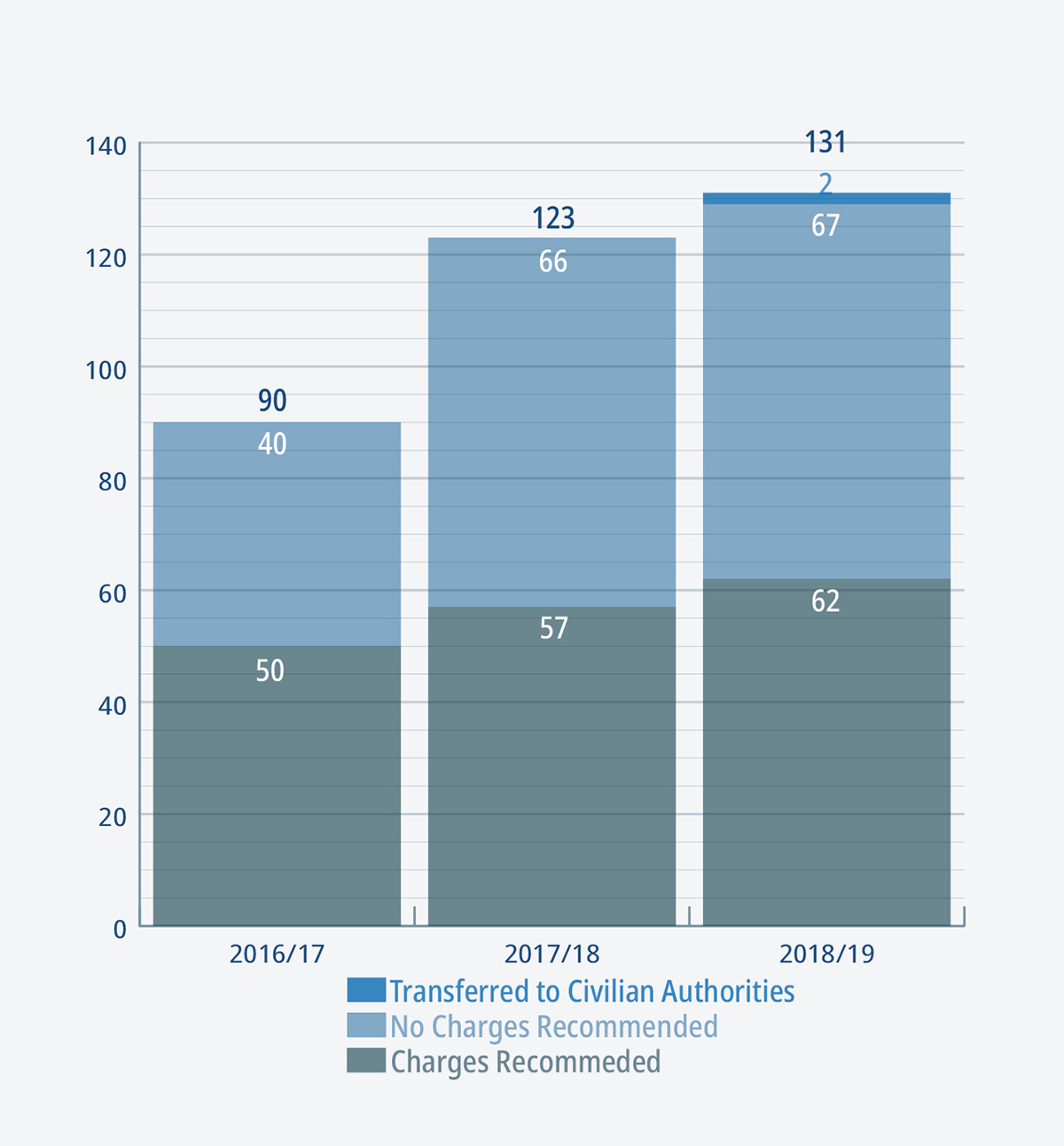
Figure 3-11: Graph breakdown
| 2016/17 | 2017/18 | 2018/19 | |
|---|---|---|---|
| Transferred to Civilian Authorities | 0 | 0 | 2 |
| No Charges Recommended | 40 | 66 | 67 |
| Charges Recommeded | 50 | 57 | 62 |
| Total | 90 | 123 | 131 |
Timelines
DMP Policy Directive 002/00 (Pre-Charge Screening) requires that prosecutors, when requested to provide pre-charge legal advice, must do so within within 14 days of receiving the file when all of the proposed charges, including electable offences, can be tried by summary trial and within 30 days in those instances where any charge would result in an automatic court martial for the accused. During this reporting period, the average number of days it took for prosecutors to provide pre-charge legal advice once the file was received was approximately 48 days.
Offence Categories
All files prosecuted by the DMP are categorized into one of four broad offence categories: sexual misconduct, drugs, conduct offences and fraud and other property related offences. The following sections provide an overview of the number of courts martial for each offence, the outcomes for each type of offence category as well as a summary of some notable cases during the reporting period.
Sexual Misconduct
Of the 51 courts martial during the reporting period, there were 20 cases that dealt with sexual misconduct. Of those 20 cases, the accused was found guilty of at least one charge in 14 cases.
R v Reyes, 2018 CM 4015
Master Warrant Officer Reyes, a reservist, pleaded guilty to a charge of disgraceful conduct for having surreptitiously made visual recordings of a female in a washroom at the Denison Armoury in Toronto. He was sentenced to imprisonment for a period of five months and a reduction in rank to the rank of Sergeant.
In considering the prosecution and defence counsel’s joint submission pertaining to sentencing, the military judge emphasized the significant breach of trust given Master Warrant Officer Reyes’ senior rank and the intrusive nature of the offence. In light of those facts, the legal precedents and the sentencing principles, the judge found the proposed sentence was reasonable.
R v Paul, 2018 CM 4013
Master Corporal Paul pleaded guilty to disgraceful conduct of a sexual nature. During the course of a holiday function at the junior ranks’ mess, the accused touched the breast of the wife of a subordinate.
Counsel made a joint submission recommending a sentence of reduction in rank to Private. During sentencing, the military judge considered aggravating factors, notably that Master Corporal Paul had been formally briefed on Operation HONOUR only a few hours prior to the incident, the incident was highly intrusive, constituted a breach of trust of military families and demonstrated a failure in leadership. The judge also considered mitigating factors, such as Master Corporal Paul’s voluntary release from the CAF following the incident and ongoing rehabilitative efforts. In the balance, the judge found that a while a reduction in rank for a member who is releasing from the CAF is largely symbolic, it meets the objectives of deterrence and denunciation under 203.1(1) of the NDA without jeopardizing the accused’s rehabilitative efforts.
Conduct Offences
Of the 51 courts martial during the reporting period, there were 21 cases that dealt with conduct offences. Of those 21 cases, the accused was found guilty of at least one charge in 20 cases.
R v McEwan, 2018 CM 4012 & 2018 CM 4019
Corporal (retired) McEwan pleaded guilty to failing to appear before a service tribunal under s.118.1 of the NDA.
While undergoing voluntary release procedures, Corporal McEwan was charged by his unit with absence without leave. Corporal McEwan failed to appear at his summary trial on two occasions. He was then charged with failing to appear at his service tribunal and the case was referred to the DMP. Again, Corporal McEwan failed to appear at his Court Martial, which led to the military judge issuing a judicial warrant for his arrest.
Subsequent to his arrest, Corporal McEwan was tried by Court Martial despite his prior release from the Regular Force, because he committed the offence while he was still a member of the Regular Force and subject to the Code of Service Discipline. The military judge stated that, despite no longer being in the military, “administering justice in relation to Mr. McEwan does have an impact on those serving today.” The judge added, “the NDA provides an obligation on members of the CAF to serve and perform duty until lawfully released. Refraining from enforcing this obligation on a person simply because he or she is on the way out of the CAF would send a message of impunity which may undermine good order and discipline of those serving within the CAF.”
At the sentencing hearing, Corporal McEwan admitted having committed service offences similar in character to the offence charged at his court martial, but for which he was not formally charged. Under s. 194 of the NDA, the military judge agreed to take these alleged offences into consideration for the purposes of the sentence as if Corporal McEwan had been charged with, tried for and found guilty. The judge sentenced the accused to imprisonment for a period of five days.
R v Worthman, 2018 CM 2024
Corporal Worthman pleaded guilty to assault under s.130 of the NDA (s. 266 of the Criminal Code) and drunkenness under s. 97 of the NDA. She was given a suspended sentence of detention for a period of ten days.
Military Police (MP) found Corporal Worthman severely intoxicated and causing a disturbance. She refused to be escorted to her home, and subsequently resisted being brought to the MP detachment, striking and injuring a MP officer during the ensuing struggle.
In a joint submission, both counsel recommended ten days detention, but given the indirect consequences of the sentence, proposed that the sentence be suspended. The military judge found no basis that “the proposed sentence would bring the administration of justice into disrepute, or is otherwise not in the public interest.” The judge agreed to a suspended sentence to promote the accused’s ongoing rehabilitative efforts.
R v Haire, 2018 CM 2015
Lieutenant-Colonel Haire, commanding officer of 1 Royal Canadian Horse Artillery pleaded guilty to neglect to the prejudice of good order and discipline under s.129 of the NDA for failing to ensure that the chamber was empty when performing the unload drill on the C7A2 rifle, resulting in the discharge of one blank round.
During the plea, the Court explained that the standard of care that Lieutenant-Colonel Haire’s conduct is measured against is that of an infantry officer. He did not have to meet an elevated standard because he was the commanding officer of a unit.
Based on multiple mitigating factors, notably Lieutenant-Colonel Haire’s acceptance of guilt at the earliest opportunity and exceptional leadership in dealing with the incident, the military judge accepted a joint submission to impose a $500 fine.
Drugs
Of the 51 courts martial during the reporting period, there were five cases that dealt with drugs. Of those five cases, the accused was found guilty of at least one charge in four cases.
R v Stow, 2018 CM 3014
Leading Seaman Stow pleaded guilty to trafficking under s. 5(1) of the Controlled Drugs and Substances Act, which constitutes an offence under s. 130 of the NDA.
The evidence before the Court demonstrated that Leading Seaman Stow trafficked in cocaine in the Halifax area, both on and off the Base, to both civilians and military members. Along with another member, Leading Seaman Stow trafficked approximately $10,000 in cocaine.
The military judge emphasized that “involvement with drugs in the military environment must be treated as a very serious matter.” The judge relied upon a joint submission by counsel and sentenced the accused to ten months imprisonment in a civilian facility.
Fraud and other Property Offences
Of the 51 courts martial during the reporting period, there were five cases that dealt with fraud and other related property offences. Of those five cases, the accused was found guilty of at least one charge in all five cases.
R v MacDonald, 2018 CM 3011
Private MacDonald pleaded guilty to stealing under s. 114 of the NDA and wilfully damaging public property.
The accused forced his entry into locked sheds, causing significant damage. He then stole a snow blower (CAF property valued at $900). Upon learning that the MP had commenced an investigation, Private MacDonald disposed of the snow blower, which was never recovered.
In imposing the sentence, the military judge considered aggravating factors of breach of trust, premeditation, non-recovered stolen property and post-offence conduct. These factors were mitigated by the guilty plea, the absence of previous convictions and the fact that the accused had since released from the CAF. On the balance, the judge sentenced Private MacDonald to a severe reprimand and a $2000 fine.
Appeals
This section provides an overview of those cases which were appealed to the CMAC as well as to the SCC. For a quick overview of the disposition of those cases appealed to the CMAC, please refer to Annex B and for those cases appealed to the SCC, please refer to Annex C.
Court Martial Appeal Court
Decisions Rendered
R v Edmunds, 2018 CMAC 2
Master Corporal Edmunds ran a fraudulent scheme whereby he contracted on behalf of the CAF with himself as a sole proprietor. After pleading guilty to one count of fraud over $5000 involving two fraudulent transactions, he was charged with several additional counts of fraud which resulted in a second trial. He was sentenced to 30 days imprisonment at his first trial. At his second trial, Master Corporal Edmunds argued that the conduct of the investigators and prosecution was abusive, mainly alleging that the prosecution had improperly split its case. The issues on appeal arose from this second trial.
During a pre-trial disclosure and abuse of process application, the charge-layer testified that he did not know any information about the charges. He had been presented with a draft Record of Disciplinary Proceedings and had simply signed it. The military judge found that the charge-layer did not have an actual and reasonable belief that an offence had been committed, incorporating this finding into his decision on the abuse of process application.
In his decision on the abuse of process, the military judge found that the prosecution had not acted in bad faith or maliciously, but concluded that subjecting Master Corporal Edmunds to two trials was an abuse of process. The military judge concluded that the prejudice arising from this abuse was the possibility that Master Corporal Edmunds would be subjected to two separate periods of incarceration. He concluded that this prejudice could be remedied through mitigation of sentence.
Master Corporal Edmunds appealed the military judge’s refusal to grant a stay of proceedings. After a review of the appeal record, the appellate counsel noted the error relating to the laying of the charges discussed above was fatal. It demonstrated that the charge-layer did not have the requisite reasonable belief to lay the charges. The court martial had therefore been without jurisdiction. This vitiated the proceedings and required the CMAC to quash the conviction. The CMAC agreed, declaring the court martial a nullity and overturning the conviction. The CMAC reiterated that the requirement that the charge-layer possess reasonable grounds to believe the accused has committed the offence charged constitutes a safeguard against the irresponsible laying of charges. A charge laid without such a belief is fatal and results in a loss of jurisdiction. Where this loss of jurisdiction arises, the subsequent referral of charges by the DMP does not cure the defect.
R v Cadieux, 2018 CMAC 3
At the end of EX Tropical Dagger in Jamaica, following festivities held on the evening of 27-28 November 2015 where the consumption of alcohol was authorized, Corporal Cadieux entered the female-only tent to find the complainant in order to invite her back to a party. He knelt beside the complainant’s cot, where she was sleeping, and called her name quietly to awaken her. According to him, she then grabbed his head, pulled him toward her and began kissing him passionately. He reciprocated her kiss and touched the complainant’s pelvic area. Corporal Cadieux testified the touch to the pelvic area was either accidental or to balance himself as he leaned over the complainant in his attempt to awaken her. The military judge accepted this explanation. As a result, the sexual nature of the touching, for the purposes of the CMAC analysis, is limited to the kissing. During the kissing, the complainant mumbled the name “Steve”, to which Corporal Cadieux replied, “It’s not Steve, its Simon”. The complainant then pushed him off, telling him to “stop” or “stop it”.
The following morning, Corporal Cadieux, still under the influence of alcohol, behaved in a disorderly manner in a number of ways. This included: (1) entering the all-female tent and refusing to leave when ordered by a superior, (2) sitting in the driver’s seat of the Jamaican Defence Force-provided bus and honking the horn, (3) bringing alcohol on the bus without authorization and (4) attempting to operate a rental vehicle while not being in a condition to do so due to his previous alcohol consumption. Corporal Cadieux was charged with one count of sexual assault and one count of drunkenness.
At trial, the military judge concluded that Corporal Cadieux lacked the requisite mens rea to commit the offence of sexual assault. As a result, he decided it was unnecessary to consider the defence of honest but mistaken belief in consent raised by Corporal Cadieux. In relation to the charge of drunkenness, the military judge stated that it was unclear whether Corporal Cadieux’s conduct on the morning of November 28th was due to the consumption of alcohol or because he was hungover. He further concluded that, although Corporal Cadieux demonstrated disturbing behaviour, there was no evidence the conduct was disorderly or that it harmed the reputation of Her Majesty’s service. Corporal Cadieux was subsequently acquitted of sexual assault and drunkenness.
The DMP appealed the acquittal on the basis that the military judge erred (1) in his assessment of the mens rea and of the defence of honest but mistaken belief in consent, (2) in his assessment of witness credibility, and (3) in his interpretation of the offence of drunkenness under section 97 of the NDA. On 8 June 2017, the DMP filed a notice of appeal to the CMAC. The case was heard on 12 March 2018. In a unanimous decision rendered on 10 September 2018, the CMAC quashed the acquittals and ordered a new trial.
The Court found that the military judge erred in not applying the requisite legal test to analyze the defence of honest but mistaken belief in consent, since raising this defence “is essentially an assertion by an accused that he or she lacked the mens rea required to commit the alleged sexual assault”. The Court reviewed the test in light of the facts and came to the conclusion that “the complainant had no reason to kiss Corporal Cadieux, he had no reason to believe she wanted to kiss him, and, importantly, immediately prior to the actual kissing, he had no reason to believe she wanted him to kiss her.”
As to the charge of drunkenness, the Court found that being hungover is so inextricably linked to the state of being drunk that creating a distinction between the two states when analysing this offence is flawed.
R v Beaudry, CMAC 2018 4
Corporal Beaudry is alleged to have sexually assaulted a female soldier on a military base. He was convicted of one offence punishable under s. 130(1)(a) of the NDA, that being sexual assault causing bodily harm contrary to s. 272 of the Criminal Code. He was sentenced to a term of imprisonment for 42 months and to dismissal from Her Majesty’s service. He was also made subject to a number of ancillary orders. Corporal Beaudry appealed his conviction, alleging that s. 130(1)(a) of the NDA was unconstitutional.
On 19 September 2018, the CMAC delivered its judgment. In a split decision, the majority found that paragraph 130(1)(a) of the NDA violates the right to a jury trial pursuant to subsection 11(f) of the Charter. The majority allowed the appeal, set aside the guilty verdict, and declared that paragraph 130(1)(a) of the NDA, is of no force or effect in its application to any “civil offence” for which the maximum sentence is five years or more imprisonment. This decision was appealed to the SCC by the DMP on behalf of the Minister of National Defence. For further information on this case, please refer to Chapter Four.
Hearings
R v Bannister, CMAC-592
Captain Bannister was a Cadet Instructor Cadre (CIC) Officer and the Commanding Officer of the 148 Royal Canadian Army Cadet Corps in Charlottetown, PEI. He was acquitted of six charges (three counts of disgraceful conduct and three alternate counts of conduct to the prejudice of good order and discipline) at a Standing Court Martial on 27 February 2018. The DMP, on behalf of the Minister, appealed this case to the CMAC. Oral arguments were heard in Halifax on 21 November 2018.
The charges arose from a number of separate incidents involving comments made by Captain Bannister.Footnote 21 On two separate occasions, Captain Bannister made a number of inappropriate sexual comments to the victim, first while she was a cadet and then later when she was a subordinate officer with the CIC.
At the court martial, the military judge concluded that the behaviour of Captain Bannister was not disgraceful, as there was no evidence that his conduct presented a significant risk of harm to the victim in a way that undermined the respect for her dignity. He also concluded that there was no evidence that his behaviour tended to adversely affect good order and discipline. More specifically, he found that although the behaviour had an adverse impact on the victim, there was no evidence that the behaviour had an adverse impact on the unit or other unit members.
On behalf of the Minister, the DMP argued that (1) the military judge applied a test for disgraceful conduct that is too restrictive and does not properly reflect the purpose and objective of the offence, (2) that the military judge refused to apply his experience and general service knowledge to determine whether the conduct was prejudicial to good order and discipline and (3) that the military judge erred in concluding that there was no evidence that the conduct tended to adversely affect good order and discipline.
A decision on this case is expected to be issued by the CMAC during the next reporting period.
R v MacIntyre, CMAC-594
On 27 June 2018, Sergeant K.J. MacIntyre was found not guilty of one charge of sexual assault by a General Court Martial. The DMP, on behalf of the Minister, appealed the decision to the CMAC. The Court heard oral arguments on 27 March 2019.
The alleged sexual assault occurred on the first night of a deployment in Glasgow, Scotland, in 2015. The complainant and the accused were both part of a fleet logistics support team. Sergeant MacIntyre was the military police officer tasked with security liaisons in foreign ports. The complainant (navy sub-lieutenant at the time) was a logistics officer.
At trial, the complainant testified that after an overnight flight, a day of work and an evening drinking and dancing, she was helped to her hotel room by the accused and another fellow female navy officer. The complainant said she fell asleep and awoke during the night to find the accused in her bed naked. He then proceeded to sexually assault her despite her repeated refusals and attempts to resist.
Sergeant MacIntyre denied the allegations of sexual assault and testified that he had consensual sex with the complainant.
On behalf of the Minister, the DMP argued two grounds of appeal, both relating to the final instructions from the military judge to the General Court Martial panel. The first one relates to incorrect instructions on the mens rea and the second to an unjustified instruction titled “inadequate police investigation”.
A decision on this case is expected to be issued by the CMAC during the next reporting period.
Appeals Initiated at the CMAC
R v Edwards, CMAC-595
On 16 November 2018, a Standing Court Martial held in Halifax, Nova Scotia, found Leading Seaman Edwards not guilty of one charge of prejudice to good order and discipline for the use of cocaine. The alleged offence occurred between 25 September 2015 and 23 July 2016, at or near Halifax, Nova Scotia, where it was alleged that the accused used cocaine, contrary to Queen’s Regulations and Orders article 20.04.
In evidence was a voluntary statement provided by Leading Seaman Edwards to an investigator with the CFNIS, in which he admitted to purchasing and using cocaine.
The military judge acquitted the accused on the basis that the prosecution did not prove that the use occurred at or near Halifax, as particularized in the charge. The military judge also expressed concerns about the voluntary confession of the accused, and chose to disbelieve portions of it despite the fact that he had no basis in law to do so.
The DMP, on behalf of the Minister, has appealed this case to the CMAC. This case will be heard in the following reporting period.
R v Spriggs, CMAC-597
On 17 October 2017, the CFNIS laid one charge of sexual assault against Corporal Spriggs for an incident alleged to have occurred on 25 July 2016. On 4 April 2018, the prosecutor preferred one charge pursuant to s. 130(1)(a) of the NDA for sexual assault contrary to s. 271 of the Criminal Code.
On 27 November 2018, the prosecutor withdrew this charge sheet and replaced it with a charge pursuant to s. 93 for behaving in a disgraceful manner. The original char-ge of sexual assault was withdrawn by the prosecution due to the inability of the prosecution to try accused individuals charged under section 130(1)(a) of the NDA by court martial as a result of the decision in Beaudry.
At the commencement of the trial for Corporal Spriggs the defence presented an application claiming that Corporal Spriggs had been subjected to an abuse of process. The defence alleged that withdrawing the sexual assault charge and substituting the disgraceful conduct charge amounted to an abuse of process in that the accused was no longer able to benefit from a jury trial through the civilian criminal justice system. The defence sought a stay of the proceedings under subsection 24(1) of the Charter as a remedy for the alleged violation.
The military judge found that Corporal Spriggs had been subjected to an abuse of process because the substitution of charges deprived Corporal Spriggs of “his newly acquired Charter right to have the charge of sexual assault heard by a judge and jury in civilian courts of criminal jurisdiction”. As a result, the military judge terminated the proceedings.
The DMP, on behalf of the Minister, appealed the Spriggs case to the CMAC. However, in preparation for the appeal, the appellate counsel conducted a detailed review of the case leading to a concern about whether there was a reasonable prospect of conviction in the event the CMAC ordered a new trial. It was determined that the matter would not be pursued at court martial even if a new trial was ordered. Therefore, on behalf of the Minister, the DMP abandoned the appeal, as it would be improper to continue forward with this appeal in the absence of a reasonable prospect of conviction.
For an overview of all appeals at the CMAC for the reporting period please refer to Annex B.
Supreme Court of Canada
Hearings Conducted
R v Gagnon, SCC 2018 41
The alleged sexual assault occurred on or about 15 December 2011 as Warrant Officer Gagnon and the complainant, a corporal, were both members of Régiment de la Chaudière, an Army reserve unit. After the annual Christmas luncheon Warrant Officer Gagnon and the complainant made their way to the armory. Warrant Officer Gagnon initiated sexual activity with the complainant progressing through four distinct sexual acts. Warrant Officer Gagnon confirmed during his testimony at trial that he took no steps to ascertain the complainant’s consent before moving from one act to the next. The complainant testified that in addition to being passive, she communicated discomfort and physically resisted, at different times during the encounter. Warrant Officer Gagnon claimed that either the complainant consented or that he held an honest but mistaken belief that she consented, if the court found that she did not.
On 22 August 2014, a General Court Martial found Warrant Officer Gagnon not guilty of sexual assault after the military judge put the defence of honest but mistaken belief in consent to the panel for consideration. On 17 September 2014, the DMP on behalf of the Minister appealed this decision to the CMAC on the basis that the military judge should not have left the defence of honest but mistaken belief in consent with the panel for consideration.
A majority of the CMAC judges found that the military judge erred by submitting to the court martial panel a defence of honest but mistaken belief in consent without having considered whether the statutory preconditions in section 273.2 of the Criminal Code had been met. Section 273.2 required Warrant Officer Gagnon to take reasonable steps in the circumstances known to him at the time to confirm consent to the sexual activities in question. Two of the three justices concluded that a judge applying the proper framework would likely consider that reasonable steps had not been taken, and would therefore have not put the defence of honest but mistaken belief in consent to the panel. On this basis, the CMAC overturned the acquittal and ordered a new trial.
The Chief Justice of the CMAC, in dissent, concluded that there was evidence of reasonable steps and an air of reality to the defence of honest but mistaken belief on the facts of the case sufficient to put the defence to the panel, and therefore there was no error at law committed by the military judge.
Warrant Officer Gagnon appealed the decision to the SCC and arguments were heard on 16 October 2018.
In a unanimous decision from the bench the SCC ruled that the defence of honest but mistaken belief in consent had no air of reality and that the trial judge committed a legal error when he instructed the panel of the General Court Martial to consider it. The SCC added that there was no evidence to show that Warrant Officer Gagnon took any steps to ascertain consent and that, as a result, the defence was barred pursuant to s. 273.2(b) of the Criminal Code. The SCC confirmed the CMAC majority decision and ordered a new trial.
R v Stillman/Beaudry, SCC 37701 and SCC 38308
These appeals to the SCC were joined together as they both deal with the constitutionality of s. 130(1)(a) of the NDA. Contextually, these appeals arose out of three separate decisions from the CMAC.
The CMAC first dealt with the central issue raised in this appeal in R v RoyesFootnote 22 . In that case, a unanimous panel concluded that the acts or omissions referred to in s. 130(1)(a) are service offences and that service offences are offences under military law. As such, s. 130(1)(a) falls within the exception to the right to a trial by jury in section 11(f) of the Charter. The CMAC further concluded that the effect of the SCC decision in R v MoriarityFootnote 23 was to correct the CMAC’s prior reasoning respecting s. 130(1)(a) and military nexus. The CMAC found that its prior jurisprudence regarding military nexus was no longer valid, and therefore that s. 130(1)(a), without resort to a military nexus test, does not violate s. 11(f) of the Charter.
The CMAC ruled on the same constitutional issue for a second time in the case of R v Déry.Footnote 24 In Déry, the Chief Justice agreed with the analysis undertaken by the CMAC in Royes. The majority, however, found that “it is only by the reading in of a military nexus test that paragraph 130(1)(a) of the NDA can pass constitutional muster”. Nevertheless, the CMAC unanimously concluded that it was bound by Royes, a decision it found to be “a fully reasoned treatment of the issue by a unanimous bench”. The constitutional challenge was dismissed.
Following the CMAC decision in Déry, a number of the appellants were granted leave to appeal to the SCC under the name of Stillman which grouped seven appellants together into one matter. Following a motion to join, the SCC ordered that the appeal of Beaudry be heard concurrently to that of Stillman. These appeals were all heard on 26 March 2019. Further information regarding this appeal is contained in Chapter Four.
Custody Review Hearings
Military judges are, in certain circumstances, required to review orders made to retain a CAF member in service custody. The DMP represents the CAF at all such hearings. During the reporting period, military prosecutors appeared at four pre-trial custody review hearings. Of those four hearings, the accused individual was released with conditions on all four occasions. A complete summary of all custody review hearings can be found at Annex D.
